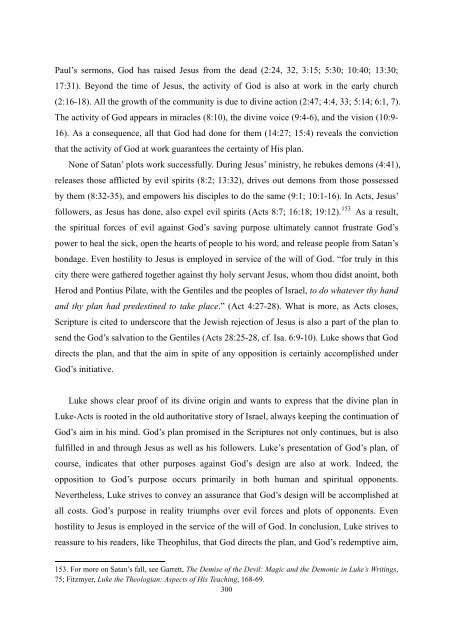the role of the lukan parables in terms of the purpose of luke's gospel
the role of the lukan parables in terms of the purpose of luke's gospel
the role of the lukan parables in terms of the purpose of luke's gospel
Create successful ePaper yourself
Turn your PDF publications into a flip-book with our unique Google optimized e-Paper software.
Paul’s sermons, God has raised Jesus from <strong>the</strong> dead (2:24, 32, 3:15; 5:30; 10:40; 13:30;<br />
17:31). Beyond <strong>the</strong> time <strong>of</strong> Jesus, <strong>the</strong> activity <strong>of</strong> God is also at work <strong>in</strong> <strong>the</strong> early church<br />
(2:16-18). All <strong>the</strong> growth <strong>of</strong> <strong>the</strong> community is due to div<strong>in</strong>e action (2:47; 4:4, 33; 5:14; 6:1, 7).<br />
The activity <strong>of</strong> God appears <strong>in</strong> miracles (8:10), <strong>the</strong> div<strong>in</strong>e voice (9:4-6), and <strong>the</strong> vision (10:9-<br />
16). As a consequence, all that God had done for <strong>the</strong>m (14:27; 15:4) reveals <strong>the</strong> conviction<br />
that <strong>the</strong> activity <strong>of</strong> God at work guarantees <strong>the</strong> certa<strong>in</strong>ty <strong>of</strong> His plan.<br />
None <strong>of</strong> Satan’ plots work successfully. Dur<strong>in</strong>g Jesus’ m<strong>in</strong>istry, he rebukes demons (4:41),<br />
releases those afflicted by evil spirits (8:2; 13:32), drives out demons from those possessed<br />
by <strong>the</strong>m (8:32-35), and empowers his disciples to do <strong>the</strong> same (9:1; 10:1-16). In Acts, Jesus’<br />
followers, as Jesus has done, also expel evil spirits (Acts 8:7; 16:18; 19:12). 153<br />
As a result,<br />
<strong>the</strong> spiritual forces <strong>of</strong> evil aga<strong>in</strong>st God’s sav<strong>in</strong>g <strong>purpose</strong> ultimately cannot frustrate God’s<br />
power to heal <strong>the</strong> sick, open <strong>the</strong> hearts <strong>of</strong> people to his word, and release people from Satan’s<br />
bondage. Even hostility to Jesus is employed <strong>in</strong> service <strong>of</strong> <strong>the</strong> will <strong>of</strong> God. “for truly <strong>in</strong> this<br />
city <strong>the</strong>re were ga<strong>the</strong>red toge<strong>the</strong>r aga<strong>in</strong>st thy holy servant Jesus, whom thou didst ano<strong>in</strong>t, both<br />
Herod and Pontius Pilate, with <strong>the</strong> Gentiles and <strong>the</strong> peoples <strong>of</strong> Israel, to do whatever thy hand<br />
and thy plan had predest<strong>in</strong>ed to take place.” (Act 4:27-28). What is more, as Acts closes,<br />
Scripture is cited to underscore that <strong>the</strong> Jewish rejection <strong>of</strong> Jesus is also a part <strong>of</strong> <strong>the</strong> plan to<br />
send <strong>the</strong> God’s salvation to <strong>the</strong> Gentiles (Acts 28:25-28, cf. Isa. 6:9-10). Luke shows that God<br />
directs <strong>the</strong> plan, and that <strong>the</strong> aim <strong>in</strong> spite <strong>of</strong> any opposition is certa<strong>in</strong>ly accomplished under<br />
God’s <strong>in</strong>itiative.<br />
Luke shows clear pro<strong>of</strong> <strong>of</strong> its div<strong>in</strong>e orig<strong>in</strong> and wants to express that <strong>the</strong> div<strong>in</strong>e plan <strong>in</strong><br />
Luke-Acts is rooted <strong>in</strong> <strong>the</strong> old authoritative story <strong>of</strong> Israel, always keep<strong>in</strong>g <strong>the</strong> cont<strong>in</strong>uation <strong>of</strong><br />
God’s aim <strong>in</strong> his m<strong>in</strong>d. God’s plan promised <strong>in</strong> <strong>the</strong> Scriptures not only cont<strong>in</strong>ues, but is also<br />
fulfilled <strong>in</strong> and through Jesus as well as his followers. Luke’s presentation <strong>of</strong> God’s plan, <strong>of</strong><br />
course, <strong>in</strong>dicates that o<strong>the</strong>r <strong>purpose</strong>s aga<strong>in</strong>st God’s design are also at work. Indeed, <strong>the</strong><br />
opposition to God’s <strong>purpose</strong> occurs primarily <strong>in</strong> both human and spiritual opponents.<br />
Never<strong>the</strong>less, Luke strives to convey an assurance that God’s design will be accomplished at<br />
all costs. God’s <strong>purpose</strong> <strong>in</strong> reality triumphs over evil forces and plots <strong>of</strong> opponents. Even<br />
hostility to Jesus is employed <strong>in</strong> <strong>the</strong> service <strong>of</strong> <strong>the</strong> will <strong>of</strong> God. In conclusion, Luke strives to<br />
reassure to his readers, like Theophilus, that God directs <strong>the</strong> plan, and God’s redemptive aim,<br />
153. For more on Satan’s fall, see Garrett, The Demise <strong>of</strong> <strong>the</strong> Devil: Magic and <strong>the</strong> Demonic <strong>in</strong> Luke’s Writ<strong>in</strong>gs,<br />
75; Fitzmyer, Luke <strong>the</strong> Theologian: Aspects <strong>of</strong> His Teach<strong>in</strong>g, 168-69.<br />
300
















